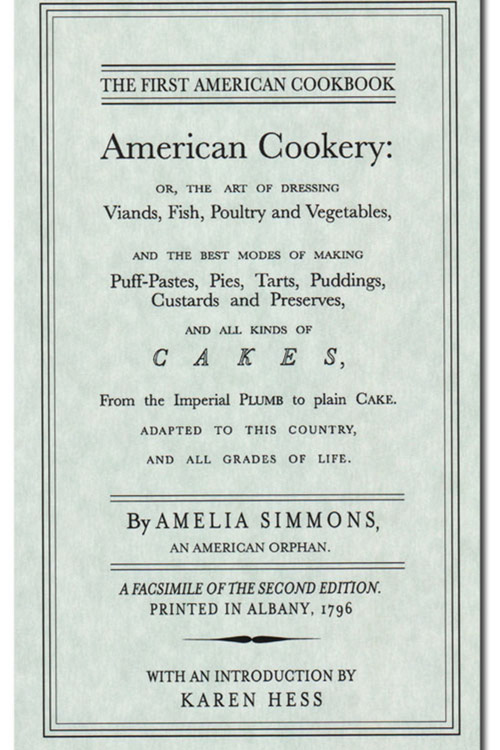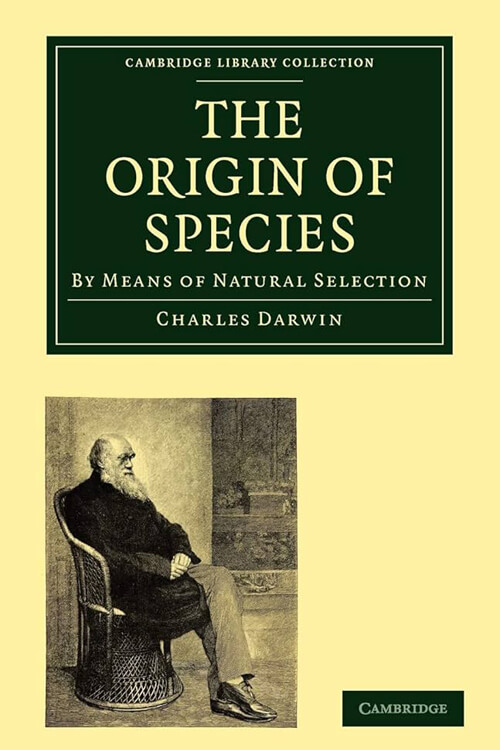
American Cookery
American Cookery, by Amelia Simmons, is the first known cookbook written by an American, published in Hartford, Connecticut 1796. Until then, the cookbooks printed and used in the Thirteen Colonies were British. Its full title is American Cookery, or the art of dressing viands, fish, poultry, and vegetables, and the best modes of making pastes, puffs, pies, tarts, puddings, custards, and preserves, and all kinds of cakes, from the imperial plum to plain cake: Adapted to this country, and all grades of life. Simmons’ American Cookery used terms known to Americans and ingredients readily available to American cooks.
It was the first cookbook to include New England specialities such as Indian pudding, johnnycake, and what is now called pumpkin pie. The cookbook was the first to suggest serving cranberry with turkey and the first to use the Hudson River Valley Dutch word cookey. It introduced the use of pearlash, a precursor of baking soda, as a chemical leavening, starting a revolution in making American cakes. The book was quite popular and was printed, reprinted, and pirated for 30 years after its first appearance. Only four copies of the first edition are known to exist. It is considered by the Library of Congress to be one of the “Books That Shaped America.”
Read or download Book
Amelia Simmons
Amelia Simmons was an American writer noted for publishing the American Cookery.
Biography
This cookbook is considered an important text that provided insights into former colonists’ language and culinary practices, helping shape American identity. It is regarded as the first American cookbook published in the United States. Little is known about Simmons’ life except that she was an orphan. She was left to the care of several guardians, who were said to have helped shape her character, one with an opinion and determination. A single woman publishing her book demonstrated this since it was not an everyday occurrence during her time.
Simmons was also forced to earn a living as a domestic worker. She was later described as a woman of modest means. In her published book, it was noted that she was preoccupied with that status in life. In her own words, Simmons claimed she was “circumscribed in her knowledge” and lacked “an education sufficient to prepare the work for the press.” According to the historian Karen Hess, Simmons probably lived in New York’s Albany area, which was the centre of the manufacture of potash, a prominent ingredient in Simmons’ recipes. The likelihood of this theory is supported by Simmons’ use of words that are Dutch in origin. Simmons’ cookbook, American Cookery, was published in 1796. During this period, all cookbooks used in the colonies were British. The book contained practical recipes that catered to the broader American audience and meals that appealed to those with larger budgets as it taught its readers “how to eat simply but sumptuously”. This work is significant for addressing the deficiencies of extant British cookbooks since it understands American culture. The cookbook was described as a place that acknowledged British heritage and introduced a new kind of cuisine and citizen cooking. Its preface claimed that it was “adapted to this country”.
While it contained recipes copied from British cookbooks, it also included meals with indigenous American recipes or meals substituting native American ingredients. Several recipes in the cookbook that were copied from British sources were mainly from the works of Susannah Carter. Simmons copied her entries on creams and syllabubs but introduced new ingredients such as cornmeal, pumpkins, and molasses. Such copying was said to be commonplace, and Simmons’ recipes also suffered from the same practice later on.






